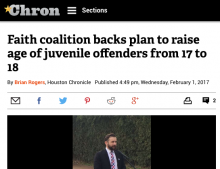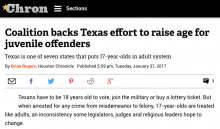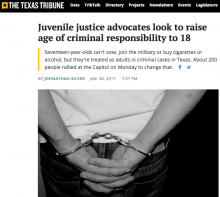Faith leaders and activists mourned the death of a Fort Bend County youth Wednesday as they gathered to announce an initiative to raise the age of juvenile offenders in Texas from 17 to 18.
Youth Justice
Coalition backs Texas effort to raise age for juvenile offenders
Texans have to be 18 years old to vote, join the military or buy a lottery ticket. But when arrested for any crime from misdemeanor to felony, 17-year-olds are treated like adults, an inconsistency some legislators, judges and religious leaders hope to change.
Juvenile justice advocates look to raise age of criminal responsibility to 18
Seventeen-year-olds can't vote, join the military or buy cigarettes or alcohol, but they're treated as adults in criminal cases in Texas. About 200 people rallied at the Capitol on Monday to change that.
Texomans weigh in on 'raise the age' push
Hours after a rally at the Texas state capitol to raise the age of juvenile jurisdiction from 17 to 18, Texomans are voicing their opinions. A local psychologist said raising the age of when a juvenile can be put into an adult jail would be a good thing.
States are raising age for adult prosecution back to 18
Miguel Moll had a choice: Would he be a beast or a victim? Moll was 17 when he was taken into custody on suspicion of joyriding. He’d been a passenger in a stolen car. It was exactly the kind of dumb thing teenagers do; but under Texas law, 17-year-olds are automatically prosecuted as adults.
Raise the Age
Listen to this podcast at reClaimed: Dialogues on Justice and Kinship.
UT study finds longer incarceration for girls, but why remains unclear
When Erin Espinosa was a probation officer in Texas, she often found herself between a rock and a hard place when she had to decide whether to keep a girl detained after committing a crime or return her on probation to a troubled home.
Girls Incarcerated Longer for Less Serious Offenses, Texas Study Shows
Girls serve longer sentences than boys in the Texas juvenile justice system, and for less serious offenses, according to a new study from the University of Texas at Austin.
Read the rest of this article at Juvenile Justice Information Exchange.
Temper Risk and Needs Assessments With Positive Youth Development
Taken on the surface, risk and needs assessments inherently undermine the principles of PYD. But, when used intentionally and carefully, using risk and needs assessments within a PYD framework could ensure better outcomes for youth and communities.
Read the rest of this article at the JuvenileJustice Information Exchange.
Lawmaker Mulling Hearing on Juvenile Justice
State Sen. John Whitmire might call a hearing and seek leadership changes at the Texas Juvenile Justice Department after multiple reports of youths fighting, climbing onto rooftops and running away from staff in large numbers at youth correctional facilities.




